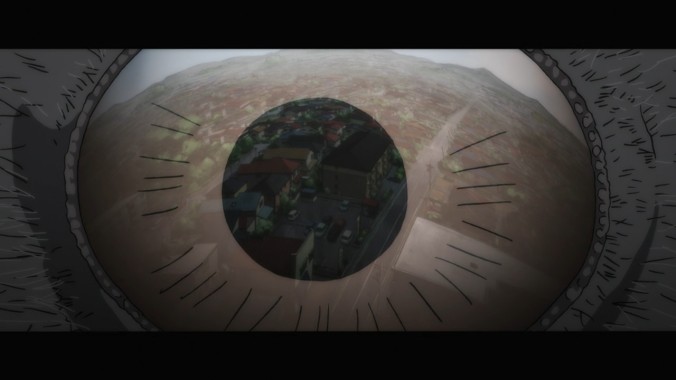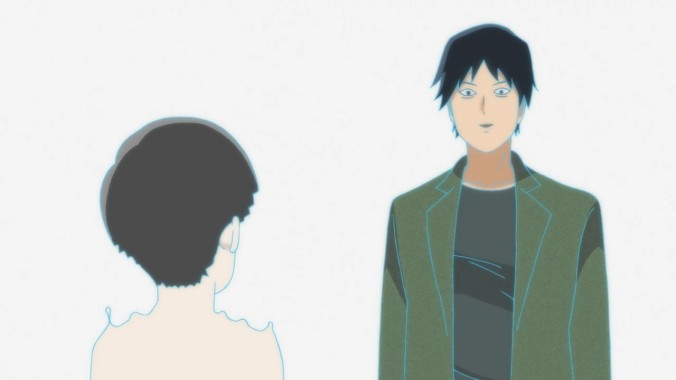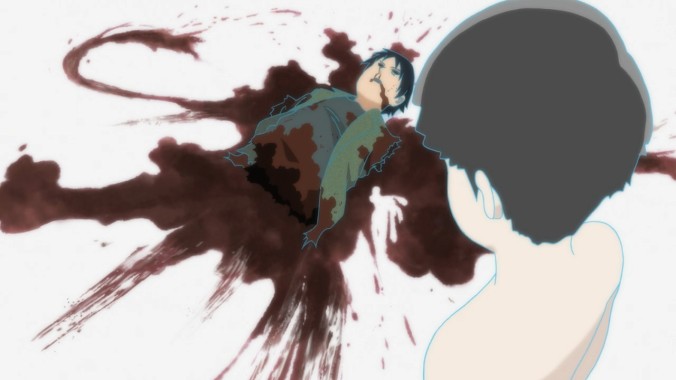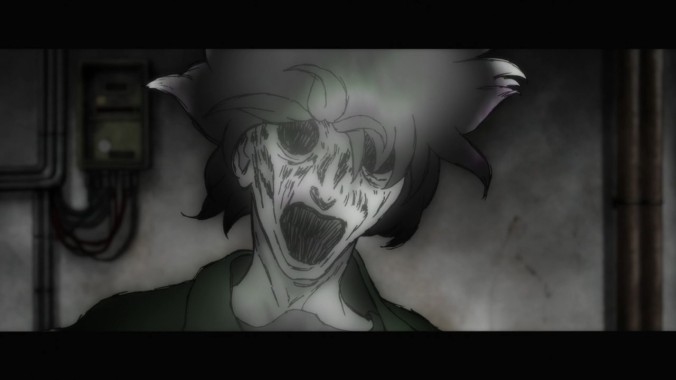Management: This essay is meant to be less of a review and more of analysis of the show being examined. It contains plot spoilers for the Mob Psycho 100 anime, especially Season 2’s Episodes 3-5.

I don’t use social media as much as I used to, and in some ways, my decision to step back has improved my stress levels. It was around maybe the beginning of college when I created a Twitter account. I was looking for sharp and animated discussion on the anime I liked. I was also looking for an easier way to keep up with political news. I’m a political scientist, after all, and I’m also an anime fan. I followed a lot of anime critics. I turned my social media feed into a news aggregator. The two spheres of Twitter that I joined ended up overlapping each other in key areas. I found myself among politically conscious anime fans, and at the beginning, I enjoyed being a part of that community. I owe my outlook towards art and life to those critics, to minds who stressed how both areas intersected with the other. They were also silly and fun, and I felt that I could let loose with them. I’ve made some great friends during those dog days of college.
The dogs were let lie and eventually put down, and my relationship with social media changed for the worse. Change marches onward regardless of our wants, and people are angrier than before. Laying alone in bed with nothing but a Twitter app, I could feel myself slipping into misanthropy. I’ve been cynical about things for as long as I could remember. I’ve always known articles to prioritize scandalous and sensational headlines. In many respects, it’s a great thing that people are more critical and skeptical about the status quo. But in remaining hooked to social media IVs in its new tenor– its drip-feed medley of terrible news and violent rhetoric — I could feel my mind wasting . My body felt heavy with the futility of existence, possessed by entities whose names in legion mean The World. I noticed it crouched over my shoulders, and I felt its weight with my own.
What with my tendency to look at events from a macro-scale (studying history does that to you), I began to see every moment of living as this tragic microcosm in the larger story of human suffering: cyclic, ceaseless, immutable, inevitable. “Bad People are a mistake,” my motto began, and then I started cutting out the “Bad.” But then I started distancing myself from the larger Twitter discourses. My headspace started clearing like god rays breaking through clouds. My career as a cloistered student is past, the me of present now teaching English to kids. There’s a joy in watching mouths gasp in understanding, in seeing eyes sparkle while tiny arms clutch black-dyed jeans during “Black!” Color Touch. There’s a sanity in working with people who know the struggles of managing children, with colleagues who want to small talk with you and invite you to their outings. The morning sun began feeling crisp everytime I stepped outside, and the mountain trees that greeted me on every drive started glowing warmly with color.

What happens to a person when he gets stuck in headspace like that for too long? How does a person get out of it? I had a choice to cut back on Twitter. Mob doesn’t when a villain traps him in a negative headspace. The villain is determined to to turn him into a raging misanthrope, and like Joker and Gordon of Batman fame, he attempts this by trapping him in an nigh-real simulation of his perspective. It lasts six months.
“Self-proclaimed esper but conman-actually” Reigen Arataka has taken up a high-profile case, and he’s brought his “protege and actual esper powerhouse”, Shigeo “Mob” Kageyama to help solve it (for him). Dimple, the former mastermind spirit behind that power-hungry cult Mob took down earlier in the show, tags along. Mob himself tries to avoid using his esper powers to make his normal life more convenient.

This time, Reigen’s been invited to the estate of a fabulously wealthy businessman. Gathering every exorcist expert, spiritual medium, and skilled esper in Japan who seemed worth their ritual salt, he offers a hefty reward to the person who can successfully exorcise the malicious spirit possessing his daughter. There’s some uncertainty at first as to whether the businessman’s claim is actually true. He unveils his reportedly afflicted daughter, locked ominously behind glass and chains. And yet, the genuine espers in the crowd state that she doesn’t show any obvious signs of oddity. What’s more, the daughter starts pleading for mercy, claiming that nothing’s wrong with her and that father’s gone mad. The conflicting accounts obviously don’t stop Reigen, and employing his powers of observation as a conman, he directs everyone’s attention to the conflicting tones of familiarity the girl uses to describe the girl’s Father/Papa.
Either because he thought the jig was up or he was getting impatient, the spirit possessing the girl drops all false pretenses, breaks out of all the girl’s bindings, and knocks out everyone in attendance. The spirit nearly smashes one of the espers’ heads in before Mob intervenes, and successfully impales the businessman’s gut with his daughter’s hand despite Mob’s efforts. The spirit turns out to be incredibly powerful, so much so that Mob is on the backfoot just defending. Dimple informs Mob and Reigen that the spirit they’re facing is someone he encountered that was once human: Mogami Keiji, a powerful esper who rocketed early into celebrity and spiraled downward into later tragedy. Unable to break through the spirit’s own defenses by normal means, and brought into urgency by the spirit’s decision to begin mutilating the girl to taunt them, Dimple and Mob come up with a risky plan. Mob attempts to transfer his consciousness into the girl’s and perform the exorcism there. Dimple then possesses Mob’s body while he’s not home, keeping it safe while keeping the spirit distracted. After a fierce struggle, the girl goes limp. The ploy succeeds…

…the spirit’s, that is. He first explains himself. His name, in fact, is Mogami Keiji. He was, in fact, a powerful esper. He used his powers to help people, and he won celebrity in the process. His mother fell ill all the same, and he lacked the money to care for her. To get that kind of scratch quickly, he turned his abilities to help people into tools that killed them, doing assassination jobs on the side. One dirty and dehumanizing job after another wasn’t enough to save his mother though, who rather than pass peacefully on or thank him for all the trouble he’s went through, becomes a spirit that spites her son. This experience, combined with all the wretched moments he’s had to put up with until now, turns him into a raging misanthrope. Swearing vengeance on humanity for tricking him out of blessings and cursing him back as thanks, he resolves to die and rise again as a vengeful spirit of immense power. He begins executing on this plan by hunting down and absorbing as many powerful and malevolent spirits as he can find and catch, leading to his past encounter with Dimple.


All throughout his piece’s telling, Mob is stuck in a hell by other people’s making. Mogami sees himself in Mob. He sees a naivety in Mob that he once possessed. Whether because he genuinely wants to help Mob out of his starry-eyed naivety or finds twisted satisfaction in breaking an innocent boy’s mind, Mogami subjects Mob to an alternate version of his life. It is a cruel parody of Mob’s junior high until now, or is it? All the support figures and role models in his alternate life are absent. His meek demeanor and social awkwardness makes him the target of relentless and malicious bullying. Mob endures this mistreatment and misery for so long (minutes of real life stretched out months of because of apparent time relativity to espers), with Mogami all but explicitly daring him to use his powers to fight back. Worst yet, the girl that he risked his consciousness to save is the instigator of the better part of his harassment. Mogami assures Mob that her behavior towards him is absolutely genuine, the worst side of her given form in the right circumstance (her attempts at quickly fitting in as a transfer student at Mob’s school).

This hellscape of a sequence is builds on the themes of an episode before. Obnoxiously awful college students demand Mob exterminate a family of ghosts minding their own business. Mob is accosted by school bullies, and stops short of putting up any meaningful resistance toward them. These predicaments posed challenges to Mob’s worldview, still impressionable, still developing. They were challenges about the larger implications of humans being awful to him and others, challenges that he left unaddressed because other people solved his problems for him before he snapped. Reigen protects him from the college students. A combination of Dimple, the Body Improvement Club, and Ritsu, his younger brother, protect him from the school bullies. Mogami raises these challenges back from the grave, and more dangerous than before, he beckons their reaching hands toward Mob.

Mob becomes isolated and alienated. He gets bullied and beaten. No one comes to his rescue like always, and the temptation to use his powers as payback grows. His old memories of people’s kindness track more distance each day, their examples of kindness tracking mud over his disposition with each indignity. He holds out for six months, and then his bullies start targeting a cat. Mob impulsively uses his powers to stop them, and then relents he sees them frightened out of their minds. The leader of the bullies shoves his mercy aside telling him he should drop dead. Distraught over her cruelty even now, Mob begs her: what has he’s done to deserve this? She smirks and continues mouthing death wishes, making the purpose of asking her why moot. He dared to finally ask, and he received a non-answer. What does it matter? The senselessness, the meaningless of her cruelty and everyone else’s malice snaps him, finally. Hair strands standing on end, the cuffs of his sleeves reeking of angry energy, he readies himself into breaking the girl he’s suffered so much to save. Mogami reclines back from a distance, savoring the results of his experiment. Once he passes this point of no return, Mob will be his to throw at The World.


Mogami’s approach to Mob in Mob Psycho 100 shares many similarities to the Joker’s approach to Police Commissioner Gordon in The Killing Joke. They’re nihilists. They despise the world and its cruel absurdities. They desire to get back the world by meeting it with their own unapologetic cruelties. And finally, they can’t stand people who don’t see things their way. The Joker insists to the Batman that he became a super villain because of one bad day of cruel and consecutive absurdities. His life was a sick joke and he wants to convince people that theirs is too. Mogami insists to Mob that he became a vengeful spirit because of a lifetime of cruel and consecutive absurdities. He hates the world for it and wants Mob to realize the absurdity and hate the world with him. Joker kidnaps and tortures Gordon with blown-up photos of his daughter stripped down and painfully crippled. Mogami traps and tortures Mob with incessant examples of people bullying and beating him and others.
Gordon resists cracking despite Joker’s absurdly cruel efforts, which Batman later holds up as proving Joker to be weak and pathetic. Gordon is an adult with plenty of life experience; compared to him, Mob is just a kid. It naturally takes another mature figure to keep him from going too far. That figure oddly comes in the form of Dimple, who arrives and finds Mob in the nick of time. He can’t directly stop him though; he doesn’t have the power to. That leaves the most powerful person in the room: Mob. Only Mob has the power to save himself in the end. Only Mob has the ability to get out his negative headspace, but that doesn’t preclude Dimple helping him regain the right mindset. He reminds him of everyone who cares about him and is grateful he exists. He reminds him that human beings are kind, and not just cruel. Mob remembers Reigen, his family, his friends. He calms down, and turns to a Mogami, ready to prove his raging misanthropy naively mistaken.

A cult comparison isn’t too off base here, considering that Mob Psycho 100 likes invoking cult imagery a lot. Whether it be in the confines of a cult compound or the interior of an apartment room, a person’s thinking can turn spiteful when surrounded by negativity and little else. I mentioned in a previous essay on Punch Line that human beings are slaves to their anecdotes. It’s a general truth that people raised in hate tend to become hateful people themselves. But even when people are given kindness throughout their lives, they can forget people can be kind when their recent experiences suggest anything but. Human beings also tend to be near-sighted. Mogami wasn’t born hateful. He wasn’t raised to be hateful, but the latter part of his life became a relentless stream of bitter experiences. Mob was much the same. He was surrounded by people who liked him and were kind, but his last six months have been nothing but the opposite. Mob was saved, and Mogami wasn’t, because he was reminded of kinder farther-sighted anecdotes.

It’s good to take a step back from it when it becomes too much, do something that clears your mind. And if you can’t, it’s nice to have people to get you out of your negative headspace.
I love reading your blog. This was a good take. To be honest Season 2 is going in even deeper and I’m pulling more from it than I did initially — which is saying something since there was a lot that touched me in the first season.
I enjoyed this. Thank you for taking the time to write it.
You’re welcome. It’s nice to hear that this essay and the blog overall is interesting to you.